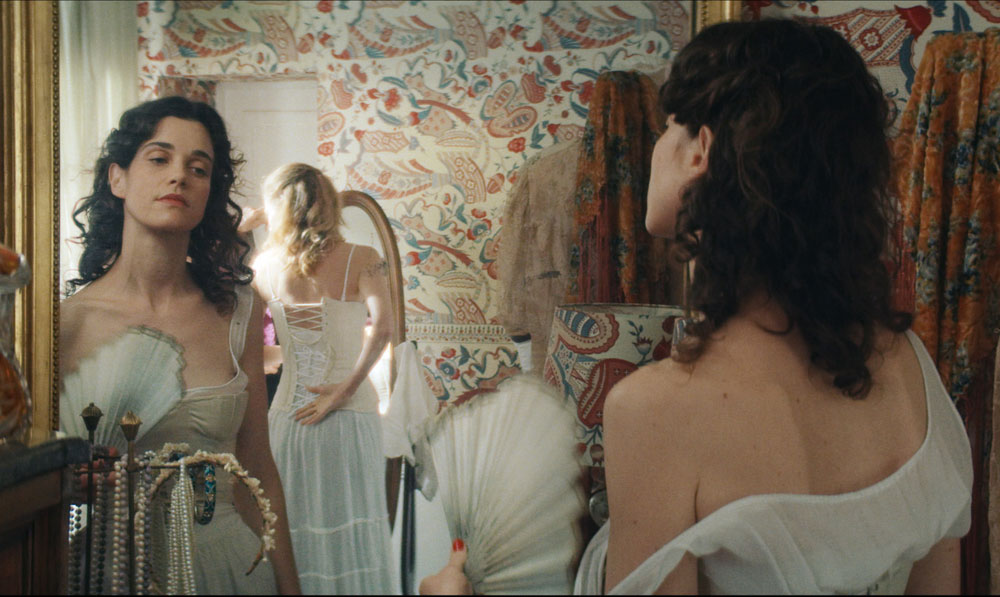Leave it to a writer to explore every meaning of the word “retreat” in “Jane Austen Wrecked My Life” when Agathe (Camille Rutherford) finds out she’s been accepted into the Jane Austen Residency, a two-week excursion for writers in an idyllic chateau where she can let the thoughts for her work come to her during long walks on the property. Keeping a roof over her head by working at Shakespeare and Co. where she’s at once she comforted by being surrounded by her favorite books and frustrated by it when she’s trying to write one herself, a break could be just what she needs, but it comes just as she and her co-worker Felix (Pablo Pauly) have taken their friendly flirtation to another – and unexpected – level, and just when it looks like she’s making progress with him after he sends her off on her trip with a kiss, she’s plagued with writers’ block for other reasons than the usual creative ones, unsure of what to make of her connection to Felix, particularly when Oliver (Charlie Anson), the driver who picks her up to take her to the residency doesn’t seem too shabby either.
If Agathe runs into a common romantic comedy dilemma, writer/director Laura Piani makes an uncommonly great one by opening up a fickle romance on two fronts when Agathe doesn’t only have to decide which suitor might make the best partner for her, but given her passion for writing, what kind of author she’d like to be as she bares her soul to the page for her own edification and success may only come if she thinks of another audience besides herself. Just as she eventually has to figure out how to waltz with both Oliver and Felix one night to find her footing, the budding author can be observed working out what’s right for her on the page, a process Piani expresses with unusual vim and vigor, and while the filmmaker suggests being decisive in any regard will bring Agathe closer to where she ultimately wants to be, it seems like the filmmaker achieves the best of both worlds herself when the film is at once a delightful comedy – with the wiry Rutherford unafraid of all the crazy contortions, physical and otherwise, Piani puts her through as the tortured writer – and an intimate look at an artist finding their way, caught between self-expression and entertainment for others.
After the film bowled over audiences last fall at the Toronto Film Festival, “Jane Austen Wrecked My Life” is arriving in U.S. theaters this week as a refreshing summertime escape and on the eve of its release, Rutherford and Piani shared the initial spark for their own professional love story, embracing and defying genre conventions that have made rom-coms so enduring and how the film is a beautiful full circle moment for its director.
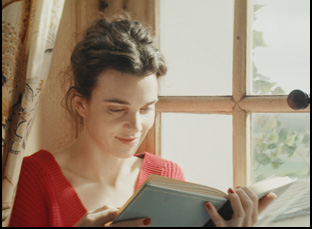
Laura Piani: Yes, I can tell you that I saw Camille in the movie and I discovered that she was also bilingual and I was absolutely sure of myself that she would be the character, so I proposed the role and we met in a cafe. She was already there when I arrived and she ordered French fries and a beer, which is always a good sign for an actress. It means she’s normal, but she’s actually drinking and eating, which is a good sign. And we’re very tall.
Camille Rutherford: Yes. And it’s rare actually to find a woman that is also tall.
Laura Piani: And she stood up to say hello and the beer fell into the French fries. And we tried to save the French fries and then we sat and I felt that I had the character that I was dreaming up was right in front of me.
Camille, what got you excited about this?
Camille Rutherford: Everything. When we met at the cafe, wiping away the beer and the fries, I felt connected to her. I liked the way she talked about the movie and cinema in general. And then I liked her script a lot. I definitely related to Agathe in many ways. Probably the thing that touched me the most is that she is a struggling writer. In my personal circle, I’m surrounded with people who write. My sister wrote a novel that came out two years ago and it was hard for her to write it and she still doesn’t like the novel that much now, even if it’s out. I remember listening to her, trying to understand why she didn’t like it and I felt I wanted to help her so much. A lot of scenes in the movie where [Agathe] is struggling, where she feels like an imposter, where she’s doubting [herself], it reminded me so much of my sister and I’m very, very close to her. Then the fact that she’s half-French, half-English like me, that was something I related to a lot.
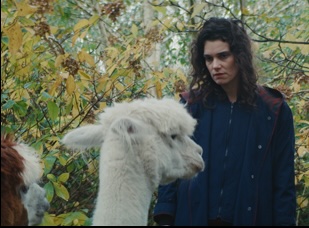
Laura Piani: I think comedy comes from the things that we’re trying to hide, the human limitations and the shame and because I was a writer myself for many years, I really needed to express my desperate and shameful experience sometimes with not being able to do anything and complaining about not having the right desk and the right seats and the right view from the window. That’s something that I really discovered when I did the writing residency myself. It’s the worst place you can send a writer to because suddenly a writer cannot complain about anything anymore and cannot find any excuse to not write. So it comes from a very intimate experience. But then it’s also the power of comedy and how actors come and bring their own experience and their own clumsiness and it becomes the mix of my experience, her experience, and the magical thing that happens on set where you can have some very unexpected incidents in a scene.
I imagine you couldn’t have left much to chance filming the ballroom scene. What was that day of shooting like?
Laura Piani: It was very difficult. It’s a miracle that it works because the actors had only one afternoon to rehearse with the dance teacher. Because we were on a very limited budget, we had a lot of constraints and we didn’t have enough costumes for everyone and we didn’t have enough lighting, so we had to come up with the [director of photography] with this idea of the candles everywhere a few days before we actually shot the film. For some reason, it was a whole night of shooting and I remember feeling the energy of the whole crew. We were all excited and not tired, probably because we were not dancing. There was this great energy, and it was one of the most joyful day of shooting somehow because it was a lot at stake, but the dancing scene where it’s not verbal anymore, but it’s just the bodies that are talking [to each other], it’s the most important. It’s the emotional peak somehow of the film, so it was really beautiful to live it collectively.
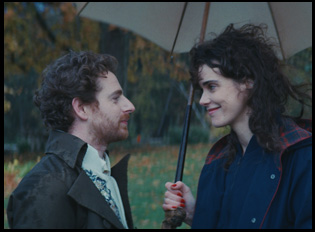
Camille Rutherford: Yeah, it always helps to be on the set. The place that inspired me and I liked the most was Shakespeare and Co., because it’s beautiful inside and I fantasized a lot about it before. It’s so old and beautiful…
Laura Piani: The one that you see in the film that we were lucky enough to be able to shoot in was the bookshop [I actually worked in]. And it’s impossible for anyone else, but because I worked there and they are my friends, we had this huge luck to shoot during the night when the bookshop was closed. It is magical and like a weird time loop where some of the most important years of my life were spent in this bookshop and where I was building myself as a reader and a screenwriter. I was working there when I was a student until I was so pregnant that I couldn’t fit behind the tilt, actually. I was stuck behind the tilt, so I had to stop working at Shakespeare and Co. [laughs] But going back 12 years later with the whole crew, it was magical.
And what inspired the film was the poem [“Path” by Jack Hirschman] that you can hear at the end that I heard at Shakespeare and Co. 15 years ago where I filmed the poet himself. The last scenes we shot during the whole six weeks of the shooting was the [reading of this] poem at night with Frederick Wiseman, who gave me this huge gift of accepting to do that. So it was extremely touching and emotional for me. It’s rare in life that you feel this cycle of time and meaningful things.
Camille, were there any choices that you made for the character that you were particularly proud of?
Camille Rutherford: Yes, we rehearsed so much that everything was pretty clear, but I did my best to try and make the character not just cute or that she’s really good because sometimes in rom-coms, female characters can be a little bit too girly and flat. For example, in “Four Weddings and a Funeral,” the part that Andie MacDowell plays, she does it really well and it’s not her fault, but because she’s beautiful and the way she’s directed, she’s not allowed to be funny or quirky. That part is reserved for Hugh Grant’s flatmate in the film. And I hate these cliches. Why can’t Andie MacDowell be funny and quirky just because she’s tall and beautiful? I was trying my best to prevent that for Agathe.
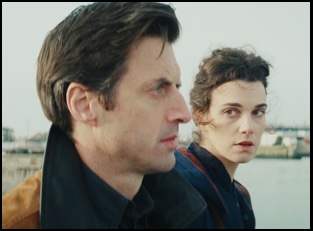
Laura Piani: I think it’s an unconscious internal conflict, so it’s not something that I formulated to myself when I was doing it. I do feel that most of the time people have a tendency to not think about the audience, to think about expressing themselves first and I find it extremely cheesy. I think you do offer something to someone when you do a film and you need to think about your audience in a good way, not because it’s a marketing decision. Because this film comes from my need as a viewer to see a rom-com that is actually a real auteur rom-com. Independent cinema should actually not look down on rom-coms and make them like more because we need romance. But it doesn’t mean it has to be super glossy and super obvious.
Camille Rutherford: It just reminds me of Hong Sang Soo, a great director. Some of his movies are good melancholy rom-coms. He does a lot of movies where two characters fall in love and there’s depth. The characters are not flat.
Laura Piani: The weirder and sadder rom-coms are, somehow the better they are, at least for me. The ones that I like the most are where you have this melancholy behind every character. So you do things and you don’t really know why you do them and then you realize that it doesn’t belong to you anymore. It belongs to the audience.
“Jane Austen Wrecked My Life” opens in limited release on May 23rd. A full list of theaters and dates is here.




